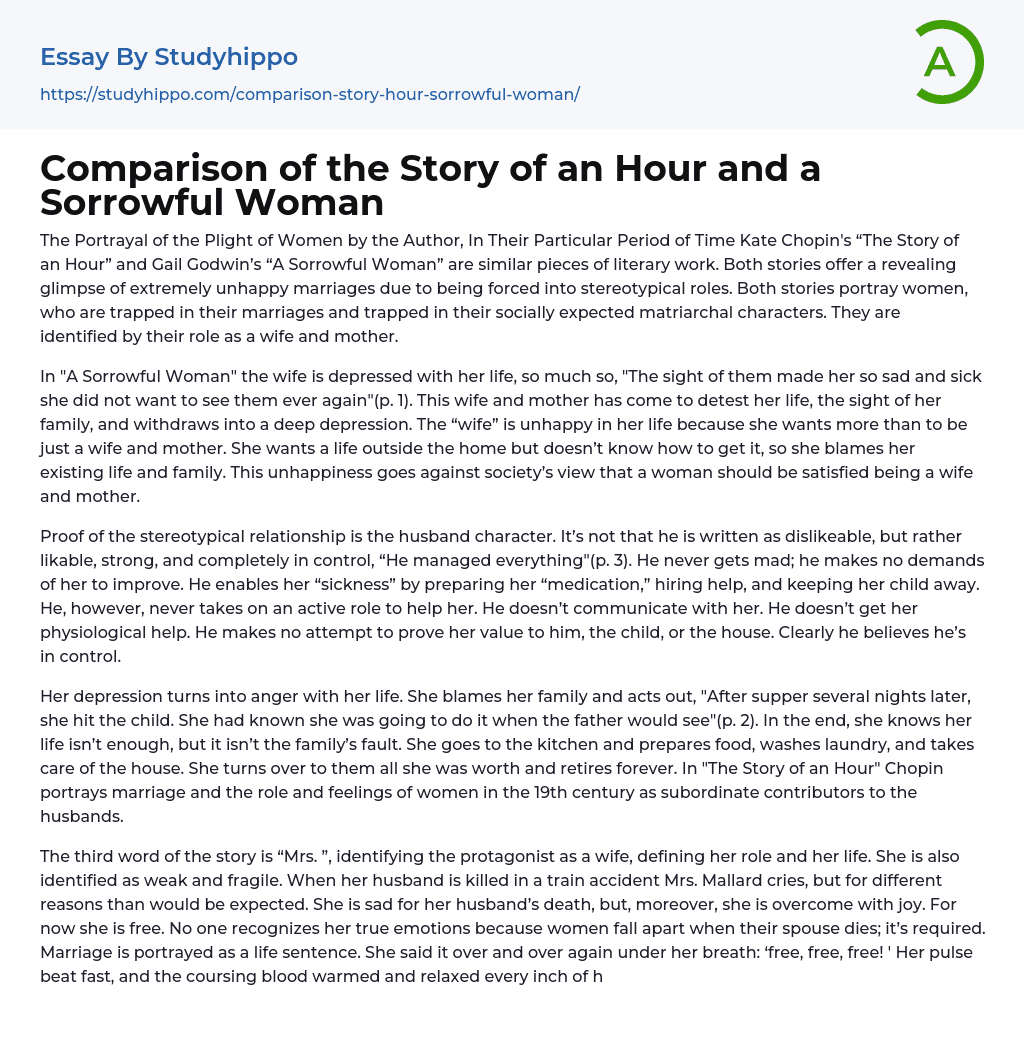

Comparison of the Story of an Hour and a Sorrowful Woman Essay Example
The Portrayal of the Plight of Women by the Author, In Their Particular Period of Time Kate Chopin's “The Story of an Hour” and Gail Godwin’s “A Sorrowful Woman” are similar pieces of literary work. Both stories offer a revealing glimpse of extremely unhappy marriages due to being forced into stereotypical roles. Both stories portray women, who are trapped in their marriages and trapped in their socially expected matriarchal characters. They are identified by their role as a wife and mother.
In "A Sorrowful Woman" the wife is depressed with her life, so much so, "The sight of them made her so sad and sick she did not want to see them ever again"(p. 1). This wife and mother has come to detest her life, the sight of her family, and withdraws into a deep depression. The “wife” is unha
...ppy in her life because she wants more than to be just a wife and mother. She wants a life outside the home but doesn’t know how to get it, so she blames her existing life and family. This unhappiness goes against society’s view that a woman should be satisfied being a wife and mother.
Proof of the stereotypical relationship is the husband character. It’s not that he is written as dislikeable, but rather likable, strong, and completely in control, “He managed everything"(p. 3). He never gets mad; he makes no demands of her to improve. He enables her “sickness” by preparing her “medication,” hiring help, and keeping her child away. He, however, never takes on an active role to help her. He doesn’t communicate with her. He doesn’t get her physiological help. He makes no attempt to
prove her value to him, the child, or the house. Clearly he believes he’s in control.
Her depression turns into anger with her life. She blames her family and acts out, "After supper several nights later, she hit the child. She had known she was going to do it when the father would see"(p. 2). In the end, she knows her life isn’t enough, but it isn’t the family’s fault. She goes to the kitchen and prepares food, washes laundry, and takes care of the house. She turns over to them all she was worth and retires forever. In "The Story of an Hour" Chopin portrays marriage and the role and feelings of women in the 19th century as subordinate contributors to the husbands.
The third word of the story is “Mrs. ”, identifying the protagonist as a wife, defining her role and her life. She is also identified as weak and fragile. When her husband is killed in a train accident Mrs. Mallard cries, but for different reasons than would be expected. She is sad for her husband’s death, but, moreover, she is overcome with joy. For now she is free. No one recognizes her true emotions because women fall apart when their spouse dies; it’s required. Marriage is portrayed as a life sentence. She said it over and over again under her breath: ‘free, free, free! ' Her pulse beat fast, and the coursing blood warmed and relaxed every inch of her body"(1). Mrs. Mallard was relieved that her husband died for she thought her sentence was over. When she realized that he was still alive, and therefore she was still committed to the marriage,
she died from the shock and horror of being trapped. In both stories, women were expected to keep house, cook, bear and rear children—but little more.
Moreover, should a woman find work, employers generally discriminated against women by hiring them for menial jobs. Repression in both women may very well have been the reason for their ailments and certainly their deaths Though a weak heart and suicide might be a stretch, as to be caused by repression, the stress of living a life that is not of one’s choosing, certainly would be a great aggravation of one’s heart and mind. The implication is made in both stories that death may be preferable to living a life outside of your control and choice.
- 1984 essays
- A Farewell to Arms essays
- A Good Man Is Hard to Find essays
- A Hanging essays
- A Lesson Before Dying essays
- A Long Way Gone essays
- A Rose For Emily essays
- A Separate Peace essays
- A Tale Of Two Cities essays
- A Very Old Man With Enormous Wings essays
- Adventures Of Huckleberry Finn essays
- Alice in Wonderland essays
- All Quiet on The Western Front essays
- Allegory of the Cave essays
- An occurrence at owl creek bridge essays
- Animal Farm essays
- Anthem essays
- Antigone essays
- Arthur Conan Doyle essays
- As I Lay Dying essays
- Atticus Finch essays
- Barn Burning essays
- Battle Royal essays
- Beauty and The Beast essays
- Beloved essays
- Boo Radley essays
- Brave New World essays
- Candide essays
- Castle essays
- Characters In Hamlet essays
- Characters In Romeo And Juliet essays
- Christmas carol essays
- Chronicle of a Death Foretold essays
- Cinderella essays
- Crime and Punishment essays
- Daisy Miller essays
- Death of a Salesman American Dream essays
- Desdemona essays
- Diary Of A Wimpy Kid essays
- Dracula essays
- Dubliners essays
- Emma essays
- Ender'S Game essays
- Ethan Frome essays
- Eveline essays
- Fahrenheit 451 essays
- First-Person Narrative essays
- Fish Cheeks essays
- Frankenstein essays
- Genesis essays



